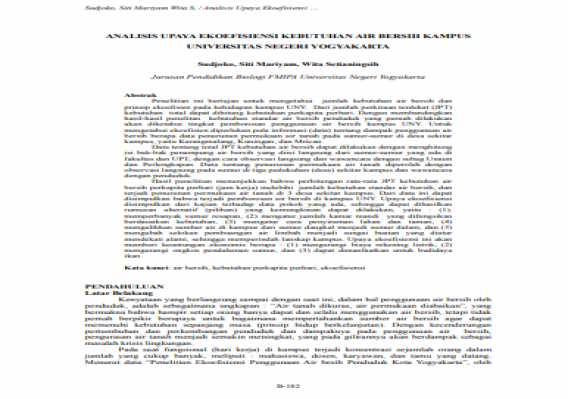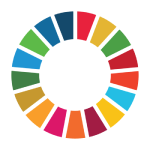ECOEFFICIENCY ANALYSIS OF CLEAN WATER NEEDS FOR UNIVERSITAS NEGERI YOGYAKARTA CAMPUS

Sudjoko, Siti Mariyam, Wita Setianingsih Biology Education Department, Universitas Negeri Yogyakarta
Abstract: This study aims to determine the number of clean water needs and the principle of eco-efficiency in UNY campus life. From the nearest estimate (JPT), it can calculate the total needs per capita per day. By comparing the research results on the demands of residents' clean water standards that have been carried out, the level of waste in the use of clean water in the UNY campus will be known. To ascertain the eco-efficiency, we also need the information (data) about the impact of using pure water in data on groundwater level decline in wells in villages around the campus, namely Karangmalang, Kuningan, and Mrican. Data on the total JPT of clean water needs can be done by calculating the contents of clean water reservoirs filled directly from wells in the faculty and UPT through direct observation and interviews with the General and Equipment sub-section. Data on groundwater subsidence was obtained by direct observation of wells in three hamlets (villages) around the campus and interviews with residents. The results showed that the average JPT calculation of the need for clean water per capita per day (work hours) exceeded the total requirements for clean water standards. As a result, there was a decrease in the groundwater level in 3 villages around the campus. From this data, we can conclude that there is a waste of clean water on the UNY campus. Eco-efficiency efforts are concluded from a study of the existing primary data to produce alternative formulations (options): (1) increase infiltration wells, (2) regulate the number of bathrooms that are functioned based on needs, (3) regulate the way of watering land and parks, (4) divert water sources on campus from shallow wells to deep wells, and (5) change the sewage ditch into an artificial river that is arranged closer to nature, thereby beautifying the campus landscape. This eco-efficiency effort will provide economic benefits in the form of: (1) reducing the cost of electricity bills, (2) reducing the cost of deepening wells, and (3) being used for fish farming.
Keywords: clean water, daily per capita needs, eco-efficiency
(ts-Abror)






